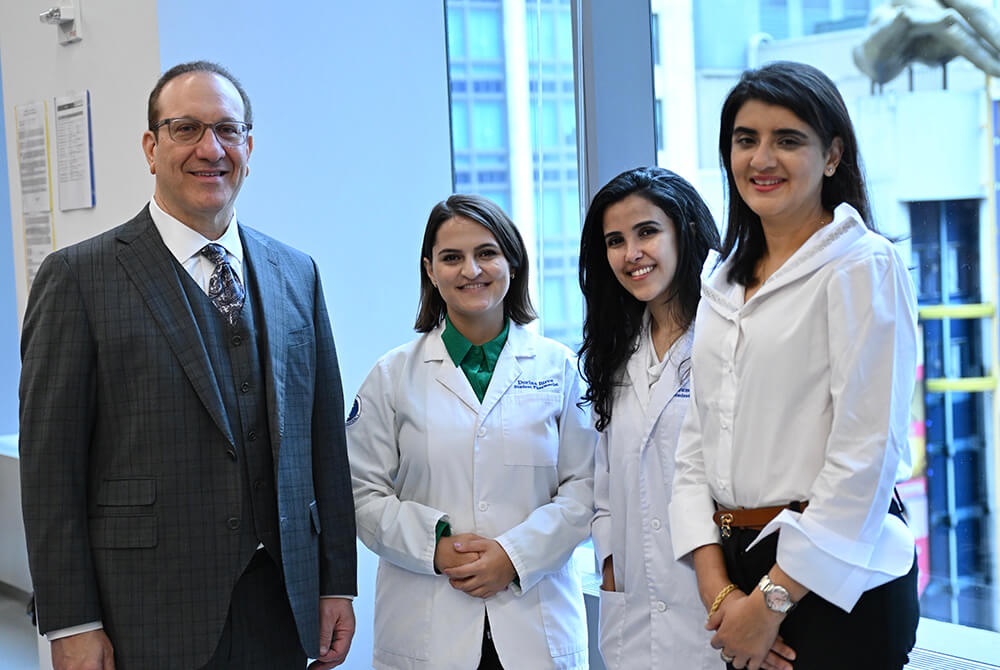Integrating Pharmacy and Public Health
Touro College of Pharmacy's PharmD/M.P.H. Program is Shaping the Future of Healthcare

For Touro College of Pharmacy (TCOP) P4 Dorina Birce, a pharmacy career was a path to work-life balance. She loved pharmacy, but also loved her family and had a five-year-old at home. Additionally, Birce was in a new program at TCOP in collaboration with New York Medical College (NYMC) that allowed her to obtain both a PharmD and a Master of Public Health (M.P.H.) at the same time.
“Pharmacy started off as a way to establish career flexibility. But after I started taking my first few M.P.H. courses, it became so much more than that,” she said.
At TCOP she learned about diseases and proven risk factors that contribute to them. But through the M.P.H. program she was learning how social, environmental and socioeconomic factors can affect behavior and development of disease.
“It helped me dive deeper,” said Birce. “I would love to utilize both degrees to make a bigger impact on patient health outcomes.”
That is exactly the outcome TCOP Associate Dean and Associate Professor Dr. Batoul Senhaji-Tomza had in mind when she founded the PharmD/M.P.H. Collaborative Program in 2021.
The idea was borne from Senhaji-Tomza’s work as a clinical pharmacist at The Johns Hopkins Hospital in Baltimore, where she saw that implementation of a simple hand hygiene program compounded with a checklist significantly reduced infection rates in individuals and, more broadly, in the intensive care unit patient population. “It was amazing,” she recalls. “Up until then, I had more of a tunnel vision about clinical care, and once I understood the impact of public health tools on patient care, my vision expanded.”
The awakening propelled her to pursue an M.P.H. at the Johns Hopkins Bloomberg School of Public Health, and after joining TCOP, she was determined to offer her students the same opportunity.
“I felt the world expanded,” Dr. Senhaji-Tomza explained. “A clinical degree gives you the tools to serve patients one-on-one, but an M.P.H. can expand the impact of care to an entire population. It is exhilarating to be part of this type of positive change.”
Collaborative Program Launches
In 2019, TCOP and the School of Health Sciences & Practice at NYMC received approval to start the collaborative program, providing a path for students to receive both a PharmD and an M.P.H. with a Health Behavior & Community Health focus. Students learn to research the effects of behavioral, social and cultural influences on individual and community health.
The first cohort of 10 students began their studies just before the COVID-19 pandemic. Interest in the program has since grown, with increased awareness and interest among students in the impact of viruses, climate change, HIV and the opioid problem, among other issues, said Dr. Senhaji-Tomza.
“Public health is definitely more on the forefront among incoming students,” she observed. “The increased need for healthcare professionals is undeniable. The pandemic raised a lot of interest about the role of public health and how we can optimize the tools that public health offers to enhance the way we deliver patient care. This new generation is very attuned to providing the utmost quality care to not only individuals, but to populations at large.”
While some students want to broaden the clinical scope of services and increase medication adherence or quality of service, others are focused on healthcare policy and expanding access to care. Some are setting their sights on working in industry, or with regulators, or with global organizations on disaster relief and other issues.
“There is really a variety of interests,” she said, “and that is the beauty of studying public health—it provides a platform to help students deepen their understanding of how they could broaden their future practice’s impact, regardless of the setting. The students that have enrolled in the program have a palpable excitement and genuine passion for public health!”
One student, P4 Meshal Imran, said her passion for public health was ignited when she visited her native Pakistan and saw disparities in access to healthcare.
“I am deeply committed to promoting equitable access to healthcare and advocating for evidence-based interventions that address the social determinants of health,” she said, such as food, housing and transportation insecurity.
Community Pharmacy
In 2022, about half of TCOP’s graduates chose to work in community pharmacy, which includes chains and independent pharmacies. Community pharmacists can affect chronic conditions like heart disease, hypertension and diabetes on a broad scale through education to change behavior.
“They can have informal conversations with patients to help tailor treatment plans based not just on clinical needs, but on the whole person—the social determinants that affect a patient’s decisions,” said Dr. Senhaji-Tomza. “Few understand the potential role of public health in elevating community pharmacy practice. Now that pharmacists are immunizers, testers and data collectors in addition to their everyday duties of filling prescriptions and counseling patients, it is even more important to leverage the available public health tools to enhance pharmacy practice.”
Martin Patrick, PharmD, TCOP Class of 2023 and a PGY-1 resident at the West Haven VA Medical Center in New Haven, CT, is completing his M.P.H. A 10-year U.S. Navy veteran and member of the inaugural cohort, Patrick worked in the ER throughout pharmacy school and the pandemic, handling calls and scheduling appointments for vaccines and testing.
“With COVID-19, I saw the bigger picture and how important we are to public health. Pharmacists had a big impact not only at the VA, but in the community, by decreasing spread and educating vets and others about COVID. There was so much misinformation about it. A lot of pharmacists will be needed for public health initiatives in the future,” he said.

